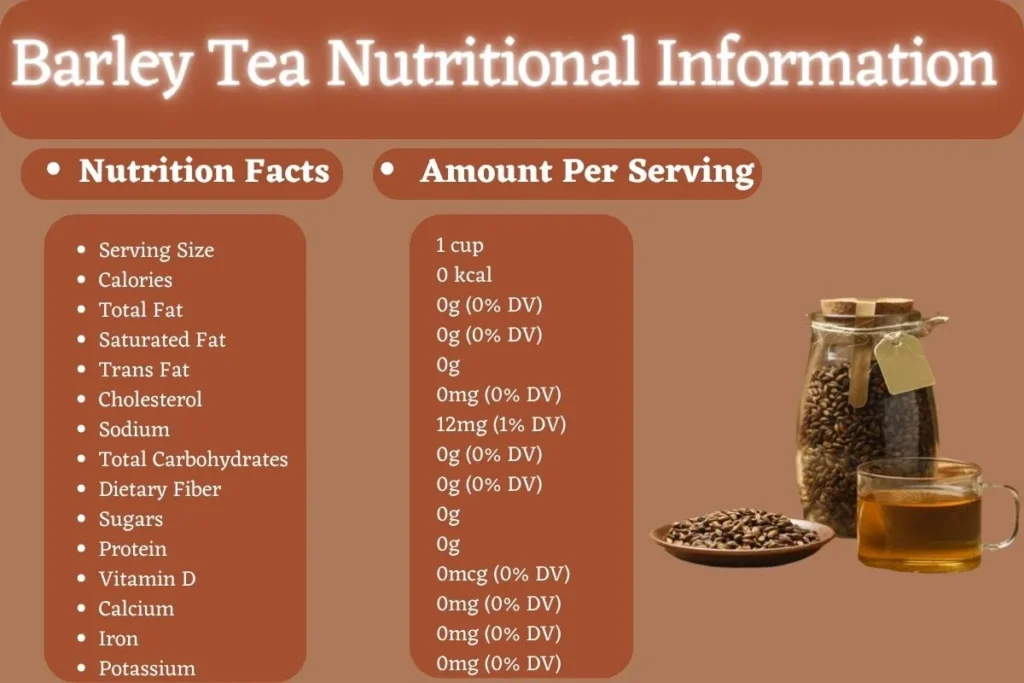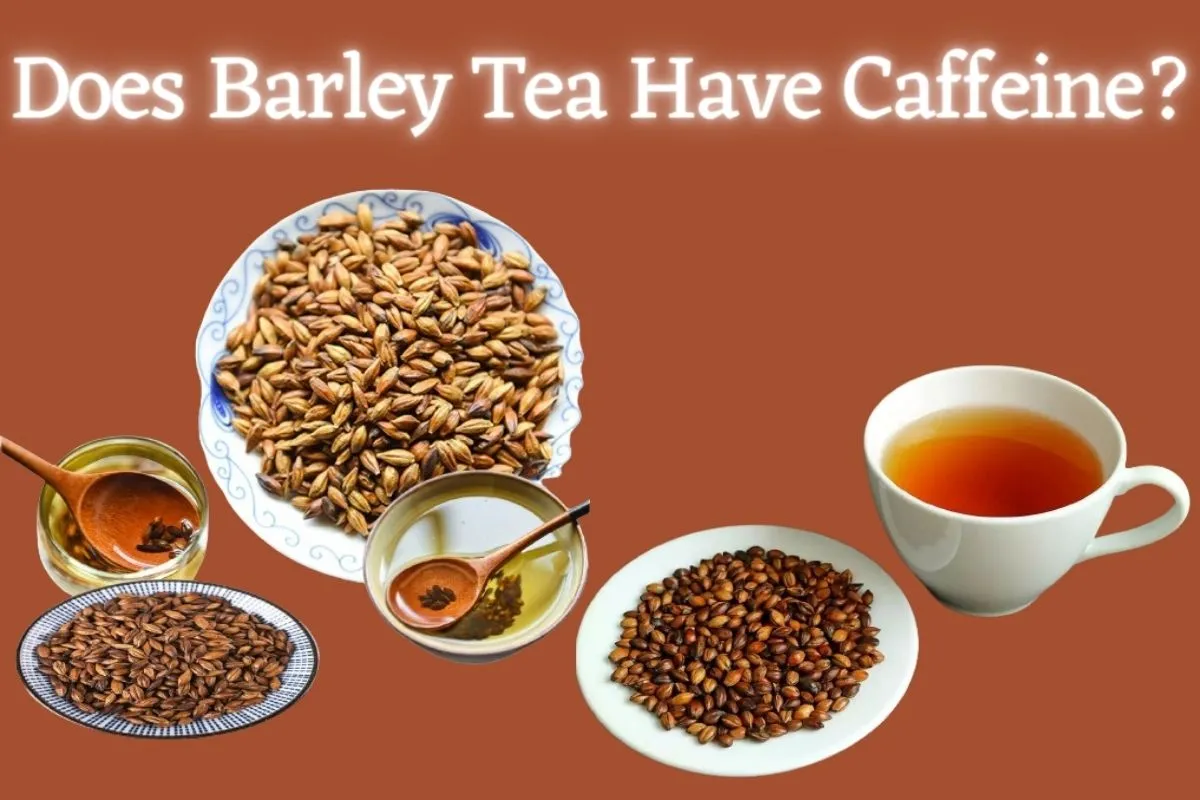A traditional beverage produced from roasted barley kernels, barley tea is also referred to as roasted barley tea, or mugicha in Japan. If you enjoy exploring different types of teas, you might have come across barley tea, a popular beverage in various parts of the world.
But one question often arises among tea enthusiasts: does barley tea Have caffeine?
Importance of Knowing Caffeine Content in Barley Tea
Barley tea, known by various names depending on the country—Damai cha in China, Mugi cha in Japan, and Bori cha in Korea—is a beverage enjoyed worldwide for its pleasant nutty, grainy taste. It’s consumed either hot or cold and is virtually calorie-free since the grains are strained out.
This tea offers several benefits, including aiding digestion, reducing inflammation, and supporting heart health due to its low caffeine content. It’s rich in fiber, which helps regulate digestion and contains antioxidants that reduce inflammation and improve liver health. Studies have found barley tea beneficial for liver function, aiding in detoxification and reducing levels of harmful enzymes in the liver.
While roasted barley tea is inherently caffeine-free, the way it’s prepared and any added ingredients could potentially introduce small amounts of caffeine. For example, blending barley tea with other teas that naturally contain caffeine can change the equation. Additionally, some commercially prepared barley teas might add flavor enhancers or other ingredients that could contain trace amounts of caffeine.
Understanding this can be especially important for pregnant women, children, and individuals with strict caffeine restrictions. Those with specific medical conditions or on medications should consult their healthcare provider before making significant changes to their diet, including regular barley tea consumption.
Does Barley Tea Have Caffeine
No, Barley tea, in its purest form, offers a delicious and naturally caffeine-free beverage option. Unlike traditional black, green, and white teas, which come from the Camellia sinensis plant, barley tea is made from roasted barley grains. This means it doesn’t contain the caffeine naturally found in true teas.
However, it’s important to note that if barley tea is blended with other teas that contain caffeine, the mixture won’t be caffeine-free. Additionally, some commercially prepared barley teas might add flavorings or other ingredients that could include trace amounts of caffeine. Always check the label to be sure!
Barley Tea Variants and their Caffeine Content
Barley tea comes in a variety of forms, and each has a unique flavor and set of characteristics. Here are some popular barley tea variants:
Roasted Barley Tea:
This classic form, made by roasting barley grains, boasts a toasty, nutty flavor and is naturally caffeine-free. It’s the foundation upon which other barley tea variations are built.
Fruit & Herbs Barley Tea:
Barley tea can be infused with fruit flavors like citrus or combined with soothing herbs like chamomile or mint. These additions offer a flavor twist while generally remaining caffeine-free.
Spices Barley Tea:
Warm spices like cinnamon or ginger can be added to barley tea, providing a cozy and aromatic experience. Again, these additions are unlikely to introduce caffeine.
Black/Green Tea Blends:
This is where things get interesting – if barley tea is combined with traditional black or green teas, the resulting blend will naturally contain caffeine due to the presence of tea leaves.
Herbal Tea Blends:
Barley tea can be blended with a wide range of caffeine-free herbal teas, offering a variety of flavor profiles and potential health benefits. Examples include blends with hibiscus, rooibos, or chamomile.
List of Ingredients in Barley Tea
Barley tea is made with a very simple list of ingredients, typically involving only two key components:
- Barley (Hordeum vulgare): The primary ingredient in barley tea is barley, a type of grain that is roasted to varying degrees to produce a nutty flavor. The barley can be used whole, cracked, or in a ground form.
- Water: Used to steep or boil the roasted barley, extracting its flavor and beneficial properties into the resulting tea.
Barley Tea Nutritional Information

Pure barley tea has a remarkably clean nutritional profile. A typical one-cup serving contains virtually zero calories, fat, cholesterol, sugar, and protein. It also offers minimal amounts of sodium and no significant vitamins or minerals. Essentially, you’re getting a flavorful beverage with a very light nutritional impact.
| Nutrition Facts | Amount Per Serving |
| Serving Size | 1 cup |
| Calories | 0 kcal |
| Total Fat | 0g (0% DV) |
| Saturated Fat | 0g (0% DV) |
| Trans Fat | 0g |
| Cholesterol | 0mg (0% DV) |
| Sodium | 12mg (1% DV) |
| Total Carbohydrates | 0g (0% DV) |
| Dietary Fiber | 0g (0% DV) |
| Sugars | 0g |
| Protein | 0g |
| Vitamin D | 0mcg (0% DV) |
| Calcium | 0mg (0% DV) |
| Iron | 0mg (0% DV) |
| Potassium | 0mg (0% DV) |
Alternatives to Barley Tea and their Caffeine Content
If you’re looking for alternatives to barley tea that are low in caffeine or caffeine-free, several options can suit different tastes and preferences. Here are some popular choices along with their typical caffeine content:
Rooibos Tea:
Also known as red bush tea, rooibos is a herbal tea from South Africa with a sweet, slightly nutty flavor. It’s naturally caffeine-free and rich in antioxidants.
Chamomile Tea:
A popular herbal tea known for its calming effects, chamomile tea is made from the dried flowers of the chamomile plant. It’s caffeine-free and often consumed before bedtime to promote sleep.
Peppermint Tea:
Made from the leaves of the peppermint plant, this tea is refreshing and can help with digestion. It’s also caffeine-free and can be enjoyed at any time of the day.
Hibiscus Tea:
A tart and fruity tea made from the flowers of the hibiscus plant, it’s deep red in color and rich in Vitamin C. Hibiscus tea is caffeine-free and can be served hot or cold.
Ginger Tea:
Made by steeping sliced or grated ginger root in hot water, ginger tea is caffeine-free and known for its digestive and anti-inflammatory benefits.
Lemon Balm Tea:
A herbal tea made from the lemon balm plant, it has a mild lemon scent and is known for its soothing properties. It’s caffeine-free and can help reduce stress and anxiety.
Dandelion Tea:
Made from the root or leaves of the dandelion plant, this tea is caffeine-free. It’s believed to have detoxifying properties and supports liver health.
Fruit Teas:
These are infusions made from dried fruits, flowers, and herbs. While not true teas, they’re naturally caffeine-free and offer a wide range of flavors, from berry to citrus and tropical fruits.
| Tea Type | Caffeine Content |
| Rooibos Tea | Caffeine-Free |
| Chamomile Tea | Caffeine-Free |
| Peppermint Tea | Caffeine-Free |
| Hibiscus Tea | Caffeine-Free |
| Ginger Tea | Caffeine-Free |
| Lemon Balm Tea | Caffeine-Free |
| Dandelion Tea | Caffeine-Free |
| Fruit Teas | Caffeine-Free |
Conclusion
If you’re looking for a satisfying and naturally caffeine-free beverage, pure barley tea is an excellent choice. Its toasty, nutty flavor and potential health benefits make it a delicious addition to your routine.
However, if you’re highly sensitive to caffeine, it’s crucial to always double-check the ingredients of any commercially prepared barley teas or blends. With a little awareness, you can enjoy the satisfying taste and benefits of barley tea without the unwanted caffeine buzz.
Frequently Asked Questions
Q1. What are the benefits of barley tea?
While more research is needed to conclusively prove all its claimed benefits, barley tea has been linked to several potential advantages. These include its rich antioxidant content, which may help protect cells from damage, possible blood sugar regulation, and potential to aid with digestion. It also contains melatonin, a sleep-promoting hormone that could lead to better sleep quality.
Q2. Why do Koreans drink barley tea?
Barley tea (bori-cha) is deeply ingrained in Korean culture. It’s enjoyed as a daily beverage, a refreshing summer drink, and is sometimes preferred over plain water. Its mild flavor, affordability, and potential health benefits are all factors contributing to its popularity in Korea.
Q3. Can I drink barley tea in the morning?
Absolutely! Since it’s caffeine-free, barley tea makes a great morning beverage. It offers a hydrating and flavorful start to the day without the jitters associated with coffee and some other teas.
Q4. Is barley tea cold or hot?
Barley tea is incredibly versatile. It can be enjoyed hot as a cozy, comforting drink, particularly during colder months. It’s also delicious served cold, providing a refreshing and caffeine-free alternative to iced teas or sugary drinks.
Q5. Can you put milk in barley tea?
While it’s not as traditional as adding milk to black tea, you can certainly experiment with it. Adding a splash of milk or plant-based alternatives can lend a creamy touch to barley tea, similar to a mild latte.

Rossi Glover, the passionate Owner of Grand Lake Coffee, infuses every cup with her love for coffee and dedication to quality. With an extensive background in the art and science of coffee, Rossi is not just a connoisseur but a storyteller, sharing the intricate tales behind each brew.

